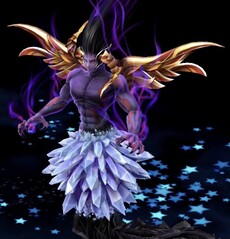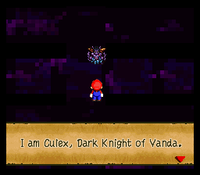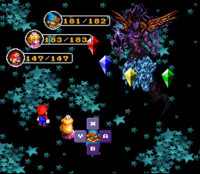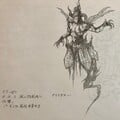Culex
| Culex | |
|---|---|
 Culex's 3D form in the remake | |
| First appearance | Super Mario RPG: Legend of the Seven Stars (1996) |
| Latest appearance | Super Mario RPG (Nintendo Switch) (2023) |
- “I am matter... I am antimatter... I can see your past... I can see your future... I consume time... And I will consume you!”
- —Culex, Super Mario RPG: Legend of the Seven Stars
Culex is an optional hidden boss who appears in Super Mario RPG: Legend of the Seven Stars. Culex is a being from a different dimension who desires to do battle with warriors from Mario's world. He appears to be a type of demon, having dark purple skin, red twisted horns and wings, a red mark along his torso, a jagged tail, and several crystals surrounding his waist. He also emanates what appears to be dark energy.
Culex serves as the game's superboss: alongside the Crystals, he is an even more powerful boss than the main story's antagonist, Smithy, as he has 4,096 HP, the second most of any encounter in the game (behind only Smithy's second phase). Culex, combined with the Crystals, has 12,396 HP, which exceeds both of Smithy's phases combined.
In the Nintendo Switch remake, Super Mario RPG, Culex initially retains his original two-dimensional 16-bit appearance, offering a stark contrast to the game's revamped and updated 3D graphics.[1] However, a post-game rematch gives him a full model, named Culex 3D, along with the Crystals.
History

Culex resides in a cross-dimensional region found behind a sealed door in Monstro Town. According to one of his neighbors, a Piranha Plant, Culex is "always mumbling about Crystal-this and an Evil-that." The sealed door that leads to Culex requires a Shiny Stone, also mentioned by the Piranha Plant. When Mario enters the region, Culex greets him and explains his story. He then challenges the party to a battle, which the player can either accept or refuse.
In battle, Culex is aided by four Crystals – the Earth Crystal, the Fire Crystal, the Water Crystal, and the Wind Crystal. These Crystals have magical attacks that correspond with their elemental power. All four Crystals can be defeated independently before targeting Culex, but if Culex falls, any remaining Crystals shatter one by one on their next turn.
If Mario's party wins, Culex rewards Mario with the Quartz Charm. Culex then leaves Mario's dimension as Mario is transported back to Monstro Town. The door to Culex also vanishes, leaving a solid rock wall in its place.
In the Switch remake, he can be fought again after beating Smithy. Because of the Star Road being repaired by Mario and his party, they consequentially granted the various wishes of powerful people. This ultimately included Culex, who wished to gain the power of the third dimension. He then drew them back to his realm to fight them in this new form.
After Mario's party wins, he is reduced back to his 2D sprite due to the forces of malevolence fading and is forced to retreat to regain his 3D form, although not before keeping count of the amount of turns it took to defeat him in battle. He will also provide the player with a Crystal Shard.
Profiles and statistics
Super Mario RPG: Legend of the Seven Stars
| Super Mario RPG: Legend of the Seven Stars enemy | |||||||||
|---|---|---|---|---|---|---|---|---|---|
| Culex | |||||||||
| HP | 4096 | FP | 200 | Speed | 50 | ||||
| Location(s) | Monstro Town | Attack | 250 | Magic attack | 100 | ||||
| Role | Boss | Defense | 100 | Magic defense | 80 | ||||
| Bonus Flower | None | Yoshi Cookie | None | Morph rate | 0% | ||||
| Evade | 0% | Magic evade | 0% | Spells | Shredder, Flame Stone, Dark Star, Meteor Blast | ||||
| Weak | None | Strong | Fear, Poison, Sleep, Mute, Critical | Sp. attacks | None | ||||
| Coins | 0 | Exp. points | 600 | Items | None | ||||
| Psychopath | "A little off, eh?" | ||||||||
Super Mario RPG (Nintendo Switch)
| Super Mario RPG enemy | |||||||||
|---|---|---|---|---|---|---|---|---|---|
| Culex | |||||||||
| HP | 4096 | Weak Elements | N/A | Drops | N/A | ||||
| Exp. | 732 | Weak Statuses | N/A | Rare Drops | N/A | ||||
| Found in | Monstro Town | ||||||||
| Monster List profile | He crossed dimensions in order to come here from the world of "Last Illusion," a story about crystals. Too bad he's still so two-dimensional. | ||||||||
| Thought Peek | "I feel...a bit out of place." | ||||||||
| Animations | |||||||||
| Super Mario RPG enemy | |||||||||
|---|---|---|---|---|---|---|---|---|---|
| Culex 3D | |||||||||

|
HP | 9999 | Weak Elements | N/A | Drops | N/A | |||
| Exp. | 732 | Weak Statuses | N/A | Rare Drops | N/A | ||||
| Found in | Monstro Town | ||||||||
| Monster List profile | You beat the toughest fight in the game! Thanks for playing all the way to the very end! -The Development Staff
| ||||||||
| Thought Peek | "You shall bear witness to the power of post-game content!" | ||||||||
| Animations | |||||||||
Regional differences
Culex's alignment and motives differ drastically between the Japanese and English versions.[2] In the Japanese version, Culex claims to be a timeless overlord made of pure evil. As a two-dimensional being, he is perplexed by the three-dimensional forms of Mario's party, so he demands a fight to try and understand them. Upon defeat, he recognizes the party's strength and positive energy, and he and his pocket dimension disappear until the day he finally gains the solidity of the third dimension. This further explains his appearance in the Super Mario RPG remake, where he is stuck as a 2D sprite rather than having a full 3D model like everyone else.[3] In the English version, Culex's dialogue and backstory are completely rewritten: he is said to be a "Dark Knight of Vanda" sent by the Dark Mage, but his plans came to a halt after discovering that Mario's world is uninhabitable to him and his kind. He remains in a secured location in the hopes that the world's "strongest knight" will seek him for a challenge before he departs. He has nobler mannerisms, and attempts to leave Mario's company on good terms. In the remake's English text, although his ties to the Dark Mage from the original localization are retained, his overall characterization is closer to that of the Japanese version, in particular his perplexion for the three-dimensional forms for Mario's party that acted as his motivation for fighting them.
Allusions to Final Fantasy
Culex himself is an allusion to the Final Fantasy series, as Super Mario RPG: Legend of the Seven Stars is developed by Squaresoft, who are the creators of the Final Fantasy series. Culex has two different sets of game sprites, one for the overworld and a much larger one for battle, with the former being from a more top-down perspective instead of isometric like other enemies. His overworld sprite resembles enemy designs in the 2D Final Fantasy titles, and these sprites do not have as complex animations and frames, reminiscent of early Final Fantasy games. This is particularly pronounced in the Nintendo Switch remake, which reuses Culex's sprite from the SNES version instead of updating him to match the new art style. Moreover, the three music tracks associated with Culex are rearrangements of three music tracks from the Final Fantasy series: his battle music is a rearrangement of the boss battle theme from Final Fantasy IV, the music that plays when he is defeated is a rearrangement of the victory music present throughout the Final Fantasy series, and the ending conversation is an arrangement of the Final Fantasy "Prelude". In the Japanese version, Culex mentions「次元のはざま」(jigen no hazama, dimensional rift), which is the same as a location in Final Fantasy V. Culex's English name appears to have a similar origin as Golbez from Final Fantasy IV, who is named after the Golubaeser fly, as "Culex" is a genus of mosquito. His English Dark Knight title may also be a reference to Cecil from the same game.
Quotes
- For a full list of quotes, see here.
- "Greetings. I am Culex, Dark Knight of Vanda. I've crossed into this dimension to fight for the Dark Mage. But this world is uninhabitable for me and my kind. I must return to my own world. Before I go, though, I would like to challenge your strongest knight. Will you accept my challenge? You will enter combat against me?"
- "You are wise to hesitate. Without any weapon or armor, you have no chance."
- "En garde!"
- "I am matter... I am antimatter... I can see your past... I can see your future... I consume time... And I will consume you!"
- "A little off, eh?"
- "Perhaps in another time, another game, we may have been mortal enemies... Let us part as comrades in arms."
- "Take this. Treasure it as a keepsake of our fight."
- "Farewell, champion knight!"
Culex 3D
- "Heh heh... Feast your eyes!"
- "This new form is worthy of your three-dimensional world!"
- "I return to this world remade."
- "I am matter and antimatter. I am past, present, and future. I will consume all of time and space!"
- "My evil power is in harmony with this three-dimensional world. And now, it will crush you!"
- "You shall bear witness to the power of post-game content!"
Gallery
Culex in the Nintendo Switch remake
Names in other languages
| Language | Name | Meaning | Notes |
|---|---|---|---|
| Japanese | クリスタラー[?] Kurisutarā |
Derived from "crystal" and the agentive suffix "-er". Possibly also evoking a mix of "crystal" (a symbol of the Final Fantasy series) and "star" (a symbol of the Mario series). | |
| Chinese (traditional) | 水晶塔拉[4] Shuǐjīngtǎlā |
From 「水晶」 (shuǐjīng, crystal) and transliteration of the Japanese name | |
| German | Crystallux[?] | ? | |
| Korean | 크리스터러[?] Keuriseuteoreo |
Crystaler; from the Japanese name. The exact spelling of "Crystaler" is "크리스털러" (Keuriseuteolleo), but it has been changed for a reason that is presumed to be a pronunciation problem. | |
| Spanish | Culex[?] | - |
Trivia
- One question that Dr. Topper can ask in the English version of the game is what Jinx, Goomba, and Culex have in common. The correct answer is: "They live in Monstro Town." In the Japanese version, this question is instead what Blooper, Leuko, and Cheep Cheep have in common, with the correct answer being "They live in the sea."
- After defeating Culex 3D then defeating Smithy in the remake, Culex appears in the credits scene with Monstermama and the other characters, briefly appearing in his 2D form behind the background.
References
- ^ Nintendo 公式チャンネル (November 2, 2023). スーパーマリオrpg Cm あの冒険がふたたび篇. YouTube. Retrieved November 2, 2023.
- ^ Culex is Quite Different in Japanese Super Mario RPG - Legends of Localization. Retrieved February 2, 2016
- ^ スーパーマリオRPG CM あの冒険がふたたび篇. Retrieved November 1, 2023.
- ^ 公開《超級瑪利歐RPG》的介紹影片。一起來回顧本作的有趣之處。 Nintendo. Retrieved November 8, 2023.


